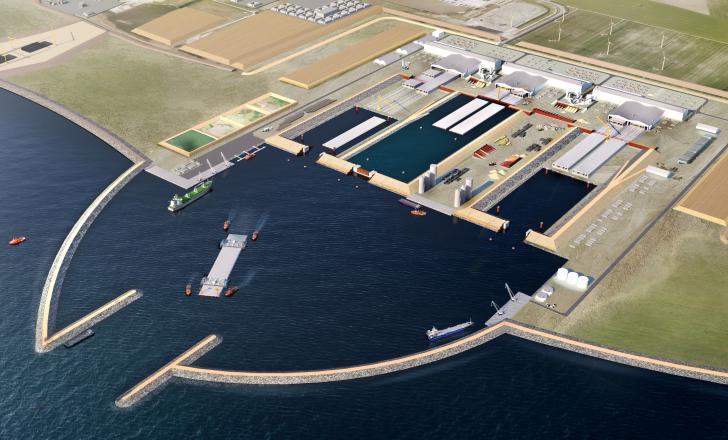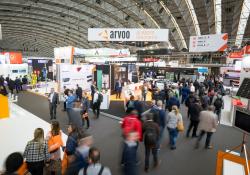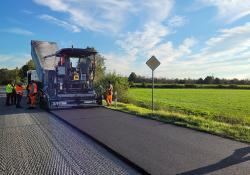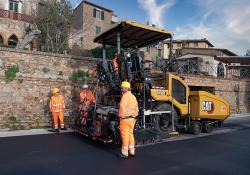
SBM Mineral Processing has won an exclusive deal to supply concrete mixing plants for the world’s longest immersed tunnel that will link Germany and Denmark.
The Fehmarnbelt Fixed Link Project is the final stage of a grand project to create an uninterrupted traffic link between Lolland, Denmark’s fourth largest island, and the German island of Fehmarn off the eastern coast of Germany’s Schleswig-Holstein state. The tunnel – 18km across the Fehmarnbelt in the Baltic Sea - will accommodate four lanes of road traffic, two emergency lanes and two railway tracks. It will take only 10 minutes to travel from Denmark to Germany by car and seven minutes by train.
Femern, a subsidiary of the Danish state-owned holding company Sund & Bælt, is planning and building the tunnel and will operate the fixed link across the Fehmarnbelt when it is finished in 2029.
In 2016, Femern awarded the tunnel portals and ramps, tunnel south and tunnel north contracts to Femern Link Contractors which then chose SBM Mineral Processing, based in Austria, to supply all the project’s concrete mixing plants.
Throughout contract negotiations, COVID restrictions and protocols were adhered to, explains Erwin Schneller, managing director of SBM Mineral Processing. “The entire order was negotiated via video calls and conferences and we have never met our customer in person before and since the contract was signed,” he said. “Our challenge is to continuously expand our technological leadership and to further strengthen our expertise in process engineering technology.”
Construction of portals and ramps and portal buildings in both Denmark and Germany started in January this year. The contract with SBM includes delivery of six plants for production of an estimated 3,000,000m³ of concrete for the tunnel’s sections, or elements. These elements will be built on land, floated out into position and eventually sunk into place and secured on the seabed.
In the first step, SBM Mineral Processing delivers a mobile EUROMIX 3300 SPACE mixing plant which will produce concrete for construction of the infrastructure.
Later this year, two out of five container-mobile horizontal mixing plant LINEMIX 4500s will be set up in what is called Factory B to produce concrete for the tunnel elements. Equipped with BHS DKX 4.5 twin-shaft mixers, these systems produce 4.5m³ concrete per batch.
The pre-fabricated mobile foundations of the LINEMIX systems ensure a quick set-up. Output capacity of the four LINEMIX types ranges from 100m3/h up to 145m3/h with hoist feeding. Also, with belt feeding, LINEMIX can permit capacities up to 330m³/h. LINEMIX can be provided both with a feed hopper of EUROMIX and with a container hopper with a storage volume up to 670m3. The container hopper is fed either by elevator or belt conveyor making the system adaptable to any situation on site.
By mid-2022, Factory A will be operating and another three LINEMIX will be involved. SBM’s partnership with CPT – Concrete Plant Technology, a system supplier and service company based in Denmark - will afford continuous support to ensure production performance.
Owner-operated SBM, which operates globally, was established in 1950 and is located in Oberweis in upper Austria. It designs and manufactures machinery and plants for the raw material and recycling industries as well as concrete mixing plants for ready-mixed and prefab concrete. SBM’s core markets are road construction and civil engineering, including all tunnel and dam construction.
“Concrete has become a high-tech product,” says Schneller. “As a machine and plant manufacturer with decades of experience we can offer innovative solutions and sophisticated concepts to our customers. This ensures that [the consortium] FLC can produce concrete economically, quickly, as sustainable as possible and in accordance with necessary quality criteria.”
The international consortium Femern Link Contractors (FLC) comprises VINCI Constructions Grands Projets (France), Aarsleff (Denmark), Max Bögl Stiftung (Germany), BAM Infra as well as BAM International (Holland), Wayss & Freytag Ingenieurbau (Germany), Solétanche-Bachy International (France), CFE (Belgium), Dredging International (Belgium).
For more information about the Fehmarnbelt tunnel project, visit www.femern.com.













